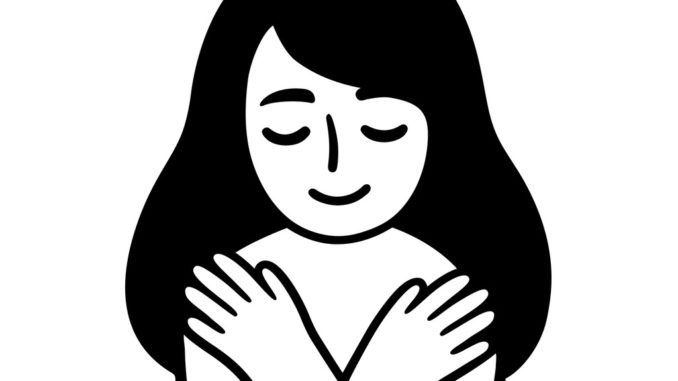
Although an estimated 15m people in the UK are currently living with a long-term health issue, and we’re constantly learning more about symptoms and treatments, the mental health impact of adjusting to a new body is much less explored. How can those of us with chronic illnesses learn to love our bodes, rather than feeling at war with them? Jenna Farmer explores
CREDIT: This is an edited version of an article that originally appeared on Happiful
When I was diagnosed with Crohn’s disease at the age of 28 my mind was bombarded with information on tests, medication and side-effects. It took me much longer to process the realities of life with a chronic condition. I focused so much on trying to feel well that I didn’t realise that my relationship with my body had completely changed.
The ‘broken body’ and chronic illness
In my 20s my new condition left me with the belief that my whole body was ‘broken’. The diagnosis was of an auto-immune disease which affected my digestive system, but faulty thought patterns left me feeling as if my whole body had just given up.
I started to scrutinise it for failures. Was I underweight? Surely a signal that my body wasn’t absorbing food properly. Did I look pale? I must be anaemic. Flaky nails? It must be a sign I’m malnourished. The rest of my body was working really hard to stay healthy, but a dialogue of blame quickly set in. I felt as if it could do nothing right – every flare-up or symptom meant my body wasn’t working like everybody else’s. I didn’t even want to look in the mirror.
These thought patterns, where we believe our body is against us, can be common but unhelpful, explains body confidence expert Lizi Jackson-Barrett, who was diagnosed with primary immune deficiency at the age of 21, and developed alopecia in her 40s.
“For those of us with chronic illness, it’s important to avoid the trap of lumping everything together, by saying things such as ‘I’m so fed up with my useless body,’” Lizi explains. “It’s crucial to mentally separate the condition from your body as a whole. How can you ever love your reflection if you keep telling yourself your whole body is no good?”
Recognise that your body is still capable of amazing things
The turning point for chronic illness and my body came when I was pregnant. Since becoming ill, I had believed that my body wasn’t strong enough to grow another life when it barely took care of mine – but my bump became a symbol of everything my body was doing right. I felt stronger and healthier than ever, and in awe of what I was capable of. I started to look in the mirror with pride, rather than despair.
It shouldn’t take having a baby to be grateful for the amazing things your body is doing. Even if you have multiple chronic conditions, you can still recognise the things your body is doing right.
Jen Parker, who has ankylosing spondylitis, fibromyalgia and psoriatic arthritis, agrees. “I initially felt like my body had failed me and I’d lost control,” Jen says. “However, several self-help books encouraged me to realise that my body was amazing.”
In fact Jen, who runs book publishing services provider Fuzzy Flamingo, believes that if she hadn’t received her diagnosis, she wouldn’t be an multi-award winning businesswoman, because the need wouldn’t have been there to work on herself. “I ended up modelling on a catwalk at the Mums in Business Association Awards, and felt amazing,” she says. “My body may not function the way I want it to, but it does a hell of a lot for me!”
Avoid comparing yourself to other people
The comparison trap of chronic illness is two-fold. We might be encouraged to compare ourselves to others to feel better. Hands up if you’ve heard phrases like, “Just think how people who are worse off than you feel.” While the intention behind such comments is often good, it can dismiss your valid concerns and feelings about your health.
But let’s not forget the comparisons we make ourselves. I remember rolling my eyes when friends would complain about feeling bloated, or if they didn’t like how they looked in an outfit. I would think, “Don’t they know how lucky they are to be walking around in a healthy body?”
“I constantly compared myself to healthy friends who could rely on their bodies not to let them down in crucial times,” explains Lizi Jackson-Barrett. “But, in a moment of clarity, I saw that no-one’s body is perfect; we all have different degrees of imperfection. If all I could see is the beauty in their imperfect bodies, why not mine?”
Integrative therapist Abbey Robb agrees. “Comparing ourselves to others is a normal human activity but, when it comes to chronic illness, those comparisons can become problematic. When we look at people who are living the kind of life we want, it can build feelings of frustration and resentment.
“Even health literature often focuses on people with the illness who are managing magnificently, rather than giving a voice to a range of experience,” Abbey adds. “It can be helpful to connect with people with the same condition, so there’s a similar foundation upon which to build comparisons.”
You’ll be surprised at what a difference can be made by simply changing your perspective, and shaking up the way you speak to, and treat, your body. Even if you don’t believe it straight away, changing that dialogue from destructive and self-deprecating language, to positive and grateful words, can make a world of difference in the long-run.
You can learn more about chronic illness and connect with a nutritionist at nutritionist-resource.org.uk


Be the first to comment